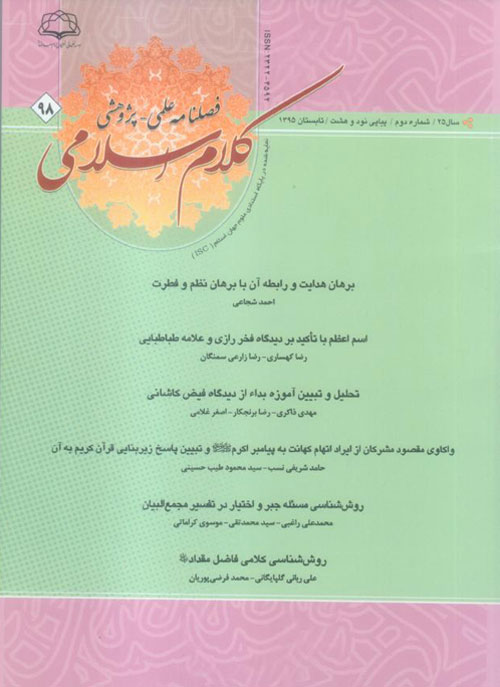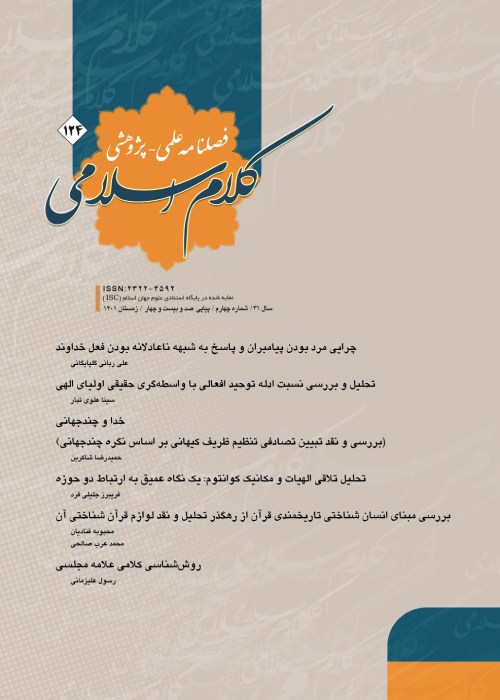فهرست مطالب

نشریه کلام اسلامی
پیاپی 98 (تابستان 1395)
- 146 صفحه، بهای روی جلد: 30,000ريال
- تاریخ انتشار: 1395/04/22
- تعداد عناوین: 7
-
-
صفحه 9یکی از براهینی که برای اثبات وجود خداوند و ربویت او اقامه شده، برهان هدایت است. غالب دانشمندان اسلامی پدیده هدایت یابی موجودات را هدایت یابی ساختاری و نظام یافته تلقی کرده و آن را در قالب برهان نظم، برهان فطرت و مانند آن مطرح کرده اند؛ لکن برخی دیگر از اندیشمندان با استناد به پاره ای از آیات قرآن کریم، هادی بودن خداوند را مستقل از خالقیت او و جدا از پدیده فطرت تلقی کرده و اصرار بر تمایز برهان هدایت از برهان فطرت و نظم دارند. در مقاله حاضر با الهام از آیات قرآن کریم، به تبیین و تقریرهای مختلف برهان هدایت پرداخته و رابطه آن با براهین همگون، از قبیل برهان نظم و فطرت مورد کاوش قرار گرفته و مواردی از هدایت یابی موجودات و کارهای شگفت آوری که از مظاهر هدایت الهی شمرده شده مطرح خواهد شد.کلیدواژگان: هدایت الهی، برهان هدایت، برهان نظم، برهان فطرت، ابداع، علم اشراقی، رویا
-
صفحه 25از آیات قرآن و روایات استفاده میشود که اسمای الهی در همه شئون وجود و عوالم هستی مادون خود نقش واسطه دارد، و جهان موجودیت خویش را از خداوند به واسطه اسماء و صفات الهی دریافت می کند؛ زیرا نظام هستی نظام علی و معلولی است که امور در آن به وسیله اسباب اجرا میشود. اسماء و صفات الهی دارای مراتب هستند؛ بعضی نسبت به بعضی ضیق، و نسبت به بعضی عام و موسع هستند، تا اینکه منتهی شود به بزرگترین اسم خدای تعالی، یعنی اسم اعظم، که به تنهایی تمامی حقایق اسماء را شامل می شود. در مورد اینکه حقیقت اسم اعظم چیست و چه آثاری دارد، راه دستیابی به آن چیست، و بهره مندان از آن کیانند، سخنان فراوانی گفته شده، بعضی آن را از مقوله لفظ و برخی از مقوله معنا می دانند، و در مصداق اسم اعظم نظرات مختلفی ابراز شده است. در این مقاله ضمن تحلیل اقوال متعدد، نظرات فخر رازی و علامه طباطبایی بطور ویژه مورد بررسی و مقایسه قرار گرفته است.کلیدواژگان: اسم اعظم، فخر رازی، علامه طباطبایی، اسماء و صفات الهی
-
صفحه 51فیض کاشانی در آثار متعددی به بحث بدا پرداخته و بر اساس آموزه های مختلفی همچون جریان دائمی خلقت، آموزه قضاء و قدر، ام الکتاب و لوح محفوظ، و لوح و قلم معنای بدا را تبیین کرده است. از نظر وی بدا با قلم نویسنده در لوح قدر و در عالم نفوس فلکی (لوح محو و اثبات) صورت میگیرد؛ در حالی که در امالکتاب (لوح محفوظ) و عالم عقول، و به طریق اولی در علم پروردگار، هیچ تغییری رخ نمی دهد. بر این اساس نتیجه میگیرد که بدا هرگز مستلزم جهل خداوند یا تغییر در علم او نیست، و اعتقاد به آن سبب ترغیب بندگان به دعا و عبادت میشود.کلیدواژگان: بدا، عالم عقول، عالم نفوس فلکی، لوح محفوظ، لوح محو و اثبات، قضا و قدر، ام الکتاب، فیض کاشانی
-
صفحه 69مشرکان مکه در صدر اسلام همواره با انواع آزارها و اتهام ها و گاه با شبهه افکنی در امر رسالت، تلاش در جلوگیری از گسترش اسلام داشتند. اتهام کهانت یکی از انواع اتهاماتی است که مشرکان در جهت ایراد شبهه و انکار رسالت پیامبر اکرم طرح می کردند. بررسی و تحلیل این اتهام و تبیین باورهای مشرکان نسبت به کهانت و کاهنان، می تواند منشا و غرض مشرکان از طرح این اتهام را مشخص کند و به تبع آن، پاسخ قرآن به این اتهام را روشن تر سازد. همچنین با تحلیل اتهام کهانت و تبیین منشا آن، این نکته کشف می شود که آنچه مشرکان را بر این اتهامات وا می داشت مبهوت ماندن آنان در برابر اعجاز قرآن کریم بود چرا که مشرکان از یک طرف عظمت قرآن کریم را چنان احساس می کردند که توانایی انکار فرابشری بودن آن را نداشتند اما از طرف دیگر نمی خواستند به الهی بودن قرآن کریم و رسالت پیامبر اکرم اعتراف کنند، به همین جهت ناچار شدند با ایراد اتهام کهانت، قرآن را منتسب به جنیان معرفی کرده و پیامبر را کاهن بخوانند.کلیدواژگان: کاهن، جن، شیاطین، الهام گیری، خبرهای غیبی، سجع
-
صفحه 93نوشتار حاضر در چند محور رهیافت علامه طبرسی به مقوله جبر و اختیار را از نظر گذرانیده است. در بخش نخست محورهای فکری نظرگاه جبراندیشی در گستره مجمع البیان طرح شده است، در بخش دوم دلایل مورد استناد علامه طبرسی در مقام اثبات تفکر اختیار ذکر شده است، در بخش سوم چگونگی رفع تناقض ظاهری میان اندیشه اختیار با سایر آموزه های نظام اعتقادی اسلام در رویکرد تفسیری علامه طبرسی به بحث گذاشته شده، و بخش پایانی یادآور کاستی هایی است که در پردازش و ارزیابی هایی موضوع جبر و اختیار در مجمع البیان دیده می شود. در پایان چنین بدست آمده است که رویکرد علامه طبرسی در این مقوله صرفا قرآنی است، و هر چند به خوبی مسئله جبر و اختیار را انعکاس داده است اما کامل نیست.کلیدواژگان: مجمع البیان، باورهای جبرگرایان، ادله اختیار گرایان، مشیت الهی، توحید در خالقیت، قضا و قدر
-
صفحه 113فاضل مقداد یکی از متکلمان برجسته شیعه است. وی علاوه بر علم کلام، در فقه و اصول نیز صاحب نظر بوده است. روش کلامی او متاثر از روش کلامی خواجه نصیرالدین طوسی و علامه حلی است. بر این اساس، تفکر عقلی فلسفی در آثار کلامی ایشان جایگاه برجسته ای دارد. روی کرد او در بیشتر مباحث کلامی، بهره گیری از استدلال عقلی است، اما در مسائلی که صبغه نقلی آنها غالب است مانند امامت خاصه و تفاصیل معاد، از ادله نقلی بهره گرفته است، چنان که در مواردی نیز عقل و نقل را در کنار یکدیگر نشانده است.کلیدواژگان: فاضل مقداد، روش کلامی، روش عقلی، روش نقلی، تاویل گرایی
-
صفحه 129
-
Page 9One of the arguments provided to establish the existence of God and his divinity is argument from guidance. Most Islamic scholars have taken the guidance in creatures as structural and ordered guidance and discussed it in the form of argument from design or argument from genesis and so on. Yet some other scholars, following some Quranic verses, have considered existence of God as a guider independent from his creation and separate from genesis of human beings and urged to distinguish between argument from guidance and argument from design and genesis. this paper, inspired from Quranic verses, will explain different accounts of argument from guidance, and its relation with similar arguments like argument from design and genesis have been analyzed, and finally some instances of guidance of creatures and their marvelous actions, which are manifestations of divine guidance, will be propounded.Keywords: divine guidance, argument from design, argument from genesis, creation, revealed knowledge, dream
-
Page 25According to the Quranic verses and Tradition (Hadith), Devine names have mediatory rule in all aspects of the cosmos, and the universe receives its existence from Allah through the Divine names and attributes. It is because the universe follows a cause and effect system in which the affairs are carried out by using the means. Divine names and attributes have degrees; some are constricted, and some others are general and broad. They consequently lead to the greatest name of Allah, i.e. the Supreme Name, which contains the meanings of all the other names. Many words have been said about the reality of the Supreme Name and its effects, the ways to achieve it, and who its beneficiaries are. Some consider it as category of words and some others relates it to the spiritual reality. There are different opinions about the true meaning of the Supreme Name. This paper analyzes different ideas in this regard, and particularly investigates the beliefs and opinions of Allameh Tabatabai and Fakhr Razi.Keywords: Supreme Name, Fakhr Razi, Allameh Tabatabai, the Names, Attributes of Allah
-
Page 51In this paper we analyze and explain the view of Feyz al-Qasani on the doctrine of Bada. Feyz has discussed this doctrine in the numerous works, and on the basis of various principles such as the constant flow of creation, the fate and destiny, al-Lavh al-Mahfouz, and the Lavh and Qalam has explained the meaning of Bada. According to him, Bada takes place by the writing on the table of fate (al-Lavh al-Mahfouz) in the world of celestial souls (table of negation and affirmation), while in the Om al-Ketab and world of intellects, not to mention the knowledge of God, there is no change. Accordingly, he concludes that, Bada requires neither the ignorance of God, nor any change in Him or His knowledge, and believing it will encourage people to pray and worship.Keywords: Feyz al-Qasani, the world of intellects, the world of celestial souls, Om al-Ketab, fate, destiny
-
Page 69In the early days of Islam, the polytheists of Mecca attempted so much to stop the spread of Islam through a variety of torments, accusations and sometimes by making doubts about the prophecy of the Prophet Muhammad (PBUH). The accusation of prognostication is one of the accusations that were made by polytheists in order to make doubt and deny the prophecy of the Prophet Muhammad (PBUH). The study and analysis of this accusation and explanation of polytheists beliefs in prognostication and prognosticator can determine the origin and purpose of polytheists from propounding and therefore can clarify the Quranic answer to this accusation.
Also with analyzing and explaining accusation of prognostication and its origin this matter will be discovered what compelled polytheists to these accusations was their astonishing against miracle of Quran, because polytheists from one hand felt the greatness of the Holy Quran that did not have ability to reject his superhuman source, and from other hand they did not want to accept divinity of the Quran and the prophecy of the Prophet Muhammad (PBUH), so they got compelled to that through accusation of prognostication and to introduce Quran as genie's words and the Prophet Muhammad (PBUH) as a prognosticator.Keywords: prognosticator, Genie, Demons, Revelation, Unseen news, Rhyme, Holy Quran -
Page 93This paper investigates Allameh-Tabarsis attitude toward determination and freewill in some aspects. at the first section it addresses intellectual aspects of determinism in Majma al-Bayan. The second section of this paper investigates the reasons that Allameh-Tabarsi used to prove freewill. The third section of this paper discusses how to solve the contradictions that evidently exist between freewill and some issues in Islamic doctorinal system, and the last section mentions deficiencies in study and analysis of determination and freewill in Majmaol-Bayan. At the end we conclude that Allameh-Tabarsis attitude in this issue is only Quranic and although Allameh-Tabarsi could analyze this issue very well, it is not complete.Keywords: Majmaol-Bayan, determinists beliefs, reasons of freewill, divine will, unity in creation, decree, destiny
-
Page 113Fazel Meqdad is a prominent Shiite theologian. He was specialist in jurisprudence and principle of jurisprudence, in addition to theology. His theological method was inspired from theological method of Nasir al-Din al-Tusi and Allamah Helli. Likewise, rational and philosophical thought in his books has distinguished status.
Tendency of Fazel Meqdad in most of the theological discussions is using rational arguments, yet he has used revealed reasons in affairs which have mostly revealed reasons like Imamah and details of hereafter. As well as has used rational and revealed reason with each other in some other cases.Keywords: Fazel Meqdad, theological method, rational method, revealed method, interpretation


